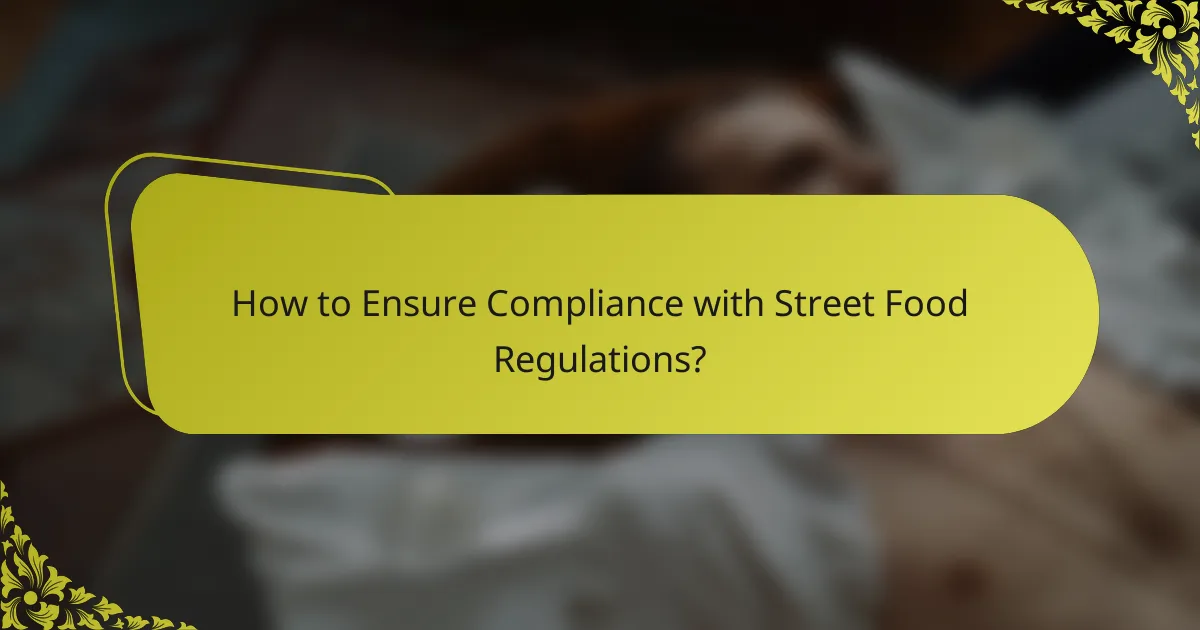Street food vendors play a vital role in urban culinary culture, but they must navigate a complex landscape of regulations to ensure compliance with health and safety standards. Key regulations in the US focus on food safety, proper licensing, and adherence to local laws, which can vary widely by region. By understanding and implementing best practices in food handling and staff training, vendors can maintain public safety while successfully operating their businesses.

What Are the Key Regulations for Street Food in the US?
Key regulations for street food in the US focus on ensuring food safety, proper licensing, and compliance with local laws. Vendors must navigate various health codes and ordinances that can vary significantly by state and city.
Health and Safety Standards
Health and safety standards for street food vendors primarily aim to prevent foodborne illnesses. These regulations often include requirements for food storage temperatures, sanitation practices, and the use of clean water for food preparation.
Vendors should familiarize themselves with the Food and Drug Administration (FDA) Food Code, which provides guidelines that many states adopt. Compliance with these standards is crucial for maintaining public health and avoiding penalties.
Licensing Requirements
Licensing requirements for street food vendors can vary widely depending on the location. Most cities require vendors to obtain a business license, a food service permit, and sometimes a specific street vendor license.
It is essential to check with local health departments and city regulations to ensure all necessary licenses are obtained before operating. Failure to secure the proper licenses can result in fines or the closure of the business.
Food Handling Regulations
Food handling regulations dictate how vendors must prepare, store, and serve food to ensure safety. This includes guidelines on cross-contamination, personal hygiene, and the proper use of utensils and equipment.
Vendors should implement practices such as regular handwashing, using gloves when handling ready-to-eat foods, and keeping raw and cooked foods separate to comply with these regulations.
Local Ordinances
Local ordinances can significantly impact street food operations, as they dictate where vendors can set up, hours of operation, and specific zoning laws. Each city may have unique rules that affect street food vendors.
It is crucial for vendors to research local ordinances and engage with city officials to understand any restrictions that may apply to their business. Ignoring these laws can lead to fines or the revocation of permits.
Inspection Protocols
Inspection protocols are a critical aspect of street food regulation, ensuring compliance with health and safety standards. Health inspectors typically conduct routine checks to assess food safety practices and overall sanitation.
Vendors should be prepared for inspections by maintaining cleanliness and proper food handling practices at all times. Keeping records of food temperatures and cleaning schedules can help demonstrate compliance during inspections.

How to Ensure Compliance with Street Food Regulations?
To ensure compliance with street food regulations, vendors must familiarize themselves with local health codes and safety standards. This involves implementing best practices in food handling, staff training, and record-keeping to meet regulatory requirements and maintain public safety.
Regular Training for Staff
Regular training for staff is essential to uphold food safety standards and comply with regulations. Training should cover topics such as hygiene practices, food storage, and emergency procedures. Sessions can be conducted quarterly or biannually to keep staff informed about any changes in regulations.
Consider using a mix of hands-on training and online resources to cater to different learning styles. Regular refreshers help reinforce knowledge and ensure that all team members understand their responsibilities in maintaining compliance.
Implementing Standard Operating Procedures
Implementing standard operating procedures (SOPs) is crucial for consistent compliance with street food regulations. SOPs should outline every aspect of food preparation, from sourcing ingredients to serving customers. Clear guidelines help staff understand the correct processes and reduce the risk of violations.
Develop SOPs tailored to your specific food offerings and local regulations. For example, if you serve raw seafood, include detailed steps for safe handling and storage. Regularly review and update these procedures to reflect any changes in regulations or best practices.
Maintaining Accurate Records
Maintaining accurate records is vital for demonstrating compliance with street food regulations. This includes keeping logs of food temperatures, cleaning schedules, and staff training sessions. Accurate documentation can help identify issues early and provide evidence of compliance during inspections.
Consider using digital tools or apps to streamline record-keeping. Ensure that records are easily accessible and organized, as this can facilitate quick reviews and audits. Regularly back up data to prevent loss and maintain a clear history of compliance efforts.

What Are the Common Challenges in Street Food Compliance?
Street food vendors often face various challenges in compliance with health and safety regulations. These challenges can include understanding local laws, adapting to changing regulations, and managing the costs associated with compliance.
Understanding Local Laws
Street food vendors must navigate a complex landscape of local laws that govern food safety, sanitation, and business operations. Each city or region may have specific licensing requirements, health codes, and operational standards that vendors must adhere to.
For instance, in the United States, food trucks may require permits from both health departments and city councils. Vendors should research their local regulations thoroughly to avoid fines or shutdowns.
Adapting to Changing Regulations
Regulations governing street food can change frequently due to public health concerns or policy updates. Vendors need to stay informed about these changes to ensure ongoing compliance.
Subscribing to local health department newsletters or joining vendor associations can provide valuable updates. Regularly reviewing local government websites can also help vendors anticipate and adapt to new requirements.
Cost of Compliance
The financial burden of compliance can be significant for street food vendors. Costs may include permits, health inspections, equipment upgrades, and training for staff on food safety practices.
Vendors should budget for these expenses and consider them in their pricing strategy. For example, initial setup costs for compliance can range from a few hundred to several thousand dollars, depending on the location and scale of the operation.

How Do Street Food Regulations Vary by State?
Street food regulations differ significantly from state to state, reflecting local health concerns, licensing requirements, and safety practices. Understanding these variations is crucial for street food vendors to ensure compliance and avoid penalties.
State-Specific Licensing
Each state has its own licensing requirements for street food vendors, which can include permits for food handling, sales, and even specific types of cuisine. For example, some states may require a mobile food vendor license, while others might have separate permits for operating in public spaces.
Vendors should check with local health departments or business licensing offices to determine the exact permits needed. Failing to obtain the proper licenses can lead to fines or the closure of the business.
Variations in Health Codes
Health codes governing street food can vary widely, with some states enforcing stricter regulations than others. These codes typically cover food storage, preparation, and sanitation practices, which are essential for ensuring food safety.
For instance, some states may require vendors to have access to running water and proper waste disposal facilities, while others might have more lenient standards. Vendors should familiarize themselves with their state’s health codes to ensure compliance and maintain customer trust.
Regional Food Safety Practices
Regional food safety practices can influence how street food is prepared and served. In areas with higher temperatures, for example, there may be stricter guidelines on food temperature control to prevent spoilage and foodborne illnesses.
Vendors should consider local climate conditions and adjust their food safety practices accordingly. This may include using insulated containers for hot foods or ensuring that perishable items are kept at safe temperatures during transport and service.

What Resources Are Available for Street Food Vendors?
Street food vendors can access a variety of resources to help them navigate compliance and standards. These resources include government websites, industry associations, and online compliance tools that provide essential information and support for operating legally and successfully.
Government Websites
Government websites are crucial for street food vendors seeking information on local regulations and licensing requirements. These sites typically outline necessary permits, health codes, and safety standards specific to food vendors in a given area.
For example, the U.S. Food and Drug Administration (FDA) offers guidelines that can help vendors understand food safety practices. Additionally, local health departments often provide resources tailored to street food operations, including inspection schedules and contact information for assistance.
Industry Associations
Industry associations play a vital role in supporting street food vendors by offering networking opportunities, advocacy, and educational resources. Organizations such as the National Association of Food Trucks (NAFT) provide members with access to best practices, legal advice, and updates on industry trends.
Joining an industry association can also help vendors stay informed about changes in regulations and connect with other food entrepreneurs for shared experiences and advice. Many associations host workshops and events that can enhance a vendor’s business acumen.
Online Compliance Tools
Online compliance tools simplify the process of adhering to regulations for street food vendors. These platforms often provide checklists, templates for permits, and resources for tracking compliance with health and safety standards.
For instance, some websites offer customizable food safety plans that vendors can adapt to their specific operations. Utilizing these tools can save time and reduce the risk of non-compliance, ensuring that vendors can focus on their culinary offerings while meeting legal requirements.

How to Handle Violations of Street Food Regulations?
Handling violations of street food regulations requires prompt action to address the issue and ensure compliance. It is essential to understand the specific regulations in your area and take corrective measures to avoid penalties.
Understand the Nature of the Violation
Identifying the type of violation is the first step in addressing it. Common issues include improper food handling, lack of permits, or failure to meet health standards. Each violation may have different consequences and remedies.
For example, if a vendor is cited for not having a health permit, they must obtain the necessary documentation before resuming operations. Understanding the violation helps in determining the appropriate corrective actions.
Communicate with Regulatory Authorities
Engaging with local health departments or regulatory bodies is crucial. Notify them of the violation and your intention to rectify it. Open communication can sometimes lead to more lenient penalties or guidance on compliance.
For instance, if a vendor receives a citation, they should reach out to the issuing authority to discuss the situation and inquire about the steps needed to resolve the issue effectively.
Implement Corrective Actions
After identifying the violation and communicating with authorities, take immediate corrective actions. This may involve training staff on proper food safety practices, obtaining necessary permits, or upgrading equipment.
For example, if the violation is related to food safety, consider conducting a thorough training session for all employees on hygiene and safe food handling techniques. Document these actions to demonstrate compliance efforts.
Monitor Compliance Regularly
Regular monitoring of compliance with street food regulations is essential to prevent future violations. Establish a routine check to ensure that all practices align with local laws and health standards.
Consider creating a checklist that includes items such as permit renewals, equipment maintenance, and staff training schedules. This proactive approach can help avoid potential issues and ensure smooth operations.
